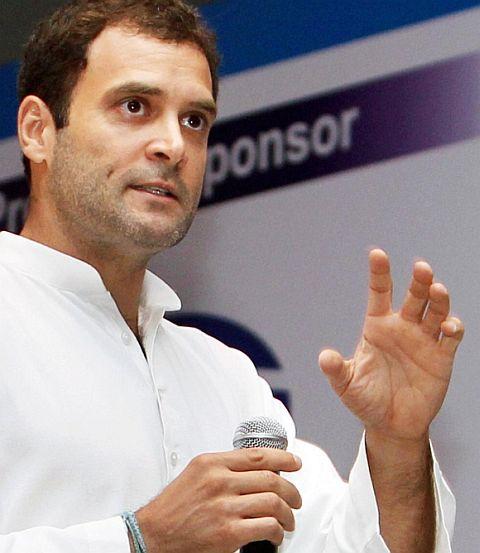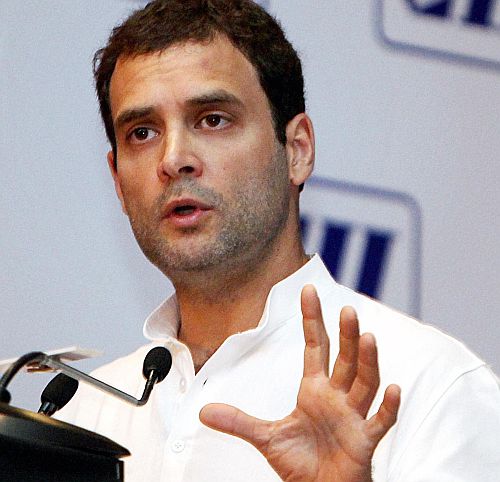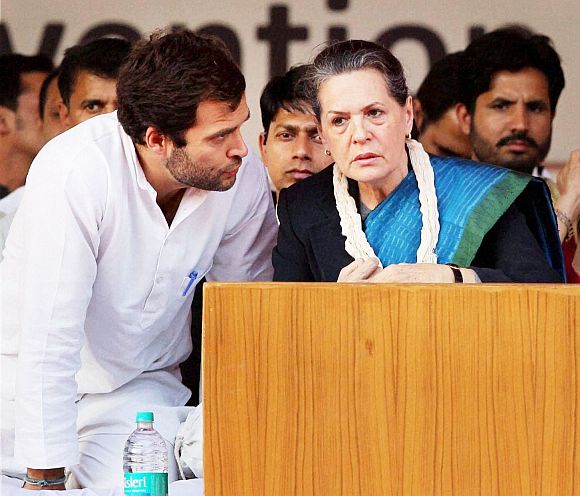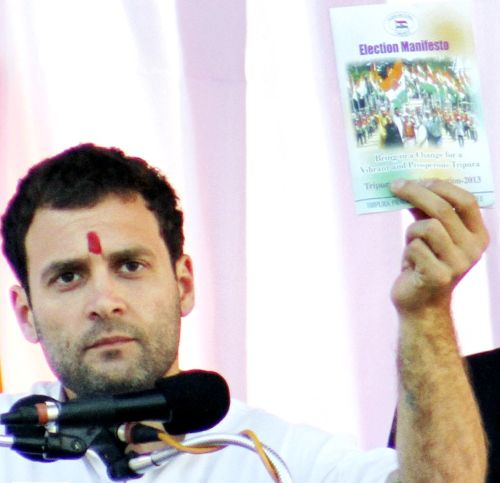 | « Back to article | Print this article |
Exclusive! Rahul Gandhi's corporate work culture
Congress Vice President Rahul Gandhi is using modern management techniques, which he picked up during his stint as a strategy consultant abroad, to revamp his party. But the moot question is: will they work? Anita Katyal reports
Congress leaders, called for marathon sessions by party vice president Rahul Gandhi on toning up the organisation, are a befuddled lot.
Used to the old feudal style of functioning where the emphasis was always on patronage and sycophancy, the cadres are struggling to adjust to the new corporate style work culture which Rahul is putting in place.
Keen to revamp the party organisation, the Nehru-Gandhi scion is going about this daunting task by using modern management techniques which he picked up during his stint as a strategy consultant abroad.
State unit chiefs and other party leaders have been given a six-page Performa seeking details about the members and heads of district and block committees, the number of meetings these committees have held, the programmes conducted by them and targets they have set for themselves for the next three months.
The present party set-up is clearly not ready for this managerial and technological leap where processes and systems are accorded greater weight age than caste equations, community identities, building relationships and dispensing patronage.
Click on NEXT to read further...
Exclusive! Rahul Gandhi's corporate work culture
Also, this supervisory technique does not take into account emotional, multi-dimensional and highly-complicated nature of Indian politics.
"Politics is a dynamic process. It cannot be reduced to power-point presentations number crunching and data processing," remarked a weary senior Congress leader who has attended several meetings called by Rahul.
Rahul used this new-age approach in the last Uttar Pradesh assembly elections when he sought to democratise the Youth Congress and the National Students Union of India through an elaborate electoral process.
However, both these experiments came a cropper. But he has not given up.
Having taken on a larger role in the party following his appointment as vice-president, Rahul is continuing to apply the same corporate-style techniques to strengthen the AICC organisation even though these failed to achieve the desired results in the party's youth wings.
For instance, his Mission Uttar Pradesh was meticulously planned on paper. He divided the state into 10 zones, each put under the charge of zonal officials who in turn reported to AICC general secretary Digivijaya Singh.
Click on NEXT to read further...
Exclusive! Rahul Gandhi's corporate work culture
Rahul has devised a similar strategy for next year's Lok Sabha polls and has deputed a group of observers to tour different parts of the country to scout around for candidates.
Having taken up his new job in all earnestness, Rahul has held a series of meetings over the past four months with AICC office bearers, MPs from different states and state leaders.
"These meetings are focused purely on organisational matters. Rahul is only interested in streamlining the party. He shows zero interest if any leader wants to talk about issues pertaining to the government, or governance," remarked a senior Congress leader who is regular at Rahul's meetings.
It will obviously take time for Rahul's ideas to be accepted by the old guard who are naturally resistant to change.
Unlike his mother, Congress president Sonia Gandhi who is more accommodating, Rahul is known to be more aggressive and impatient in his approach.
Click on NEXT to read further...
Exclusive! Rahul Gandhi's corporate work culture
Not one for the old darbari culture, Rahul is known to be brusque with people who land up at his residence too for favours.
Unlike other politicians, he does not indulge voters from his constituency by doling out favours in the form of transfers and postings.
In his zeal to transform the party, he has repeatedly said that he wants to build a cadre of leaders, usher in greater transparency and do away with the culture of nominations.
These are undoubtedly extremely laudable plans. But the moot question is: will they work?
The experience, so far, has not exactly been encouraging.



